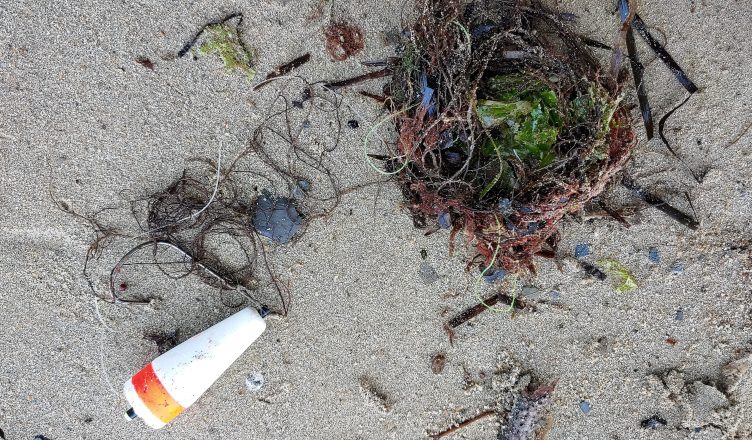Exciting news! We’re receiving funding from the National Oceanic and Atmospheric Administration’s Marine Debris Program to tackle marine debris in New Hampshire and Maine. We’ll be partnering with several other organizations around the Gulf of Maine. Our portion of the grant will result in $52,800 over two years. This funding will expand our Adopt-a-Beach, fishing line recycling, and outreach programs.
Marine debris is prevalent in our region and it can have wide-ranging impacts. Marine debris threatens animals through entanglement or ingestion. It can harm swimmers, boaters and beachgoers. There are many organizations in the region working on this issue. Working together will allow us to share ideas and methods, reach a larger audience and reduce marine debris in the Gulf of Maine.
We’re excited to be part of this cross-border collaboration and look forward to updating you on the project. The project is managed by the Gulf of Maine Association. Read their official news release below:
MEDIA RELEASE: November 10, 2021
From Gulf of Maine CouncilUS and Canadian Partners Launch Binational Effort to Address Marine Debris in the Gulf of Maine
GULF OF MAINE REGION (NOVA SCOTIA, NEW BRUNSWICK, MAINE, NEW HAMPSHIRE, MASSACHUSETTS) – The Gulf of Maine Association has been awarded $367,839 from the National Oceanic and Atmospheric Administration’s (NOAA) Marine Debris Program to partner with NOAA, Gulf of Maine Council, Blue Ocean Society for Marine Conservation, Center for Coastal Studies, Huntsman Marine Science Centre, Maine Coastal Program – Maine Department of Marine Resources, Surfrider Foundation, Urban Harbors Institute and the five jurisdictions bordering the Gulf of Maine to create an international collaborative approach for addressing plastic and other marine debris in the Gulf of Maine watershed. Funding was awarded by NOAA’s North America Marine Debris Prevention and Removal Grant program which supports projects that prevent and remove debris in Mexico and the US-Mexico and US-Canada border areas. This project will leverage an additional $448,153 in non-federal matching support to expand the scope of regional efforts to reduce plastic pollution and marine debris.
“Thanks to generous funding from NOAA’s Marine Debris Program, the Gulf of Maine Association is convening US and Canadian partners to advance implementation of NOAA’s 2019 Gulf of Maine Marine Debris Action Plan by implementing gulf-wide and targeted actions to remove, reduce and prevent the introduction of marine debris into the Gulf of Maine,” said Joan LeBlanc, Executive Director of the Gulf of Maine Association. “Our project team brings together experts from throughout the region to conduct over 100 coastal cleanups, track marine debris, and reduce the introduction of plastics, fishing gear and other sources of marine debris before they damage fisheries, marine mammals and other natural resources in the Gulf of Maine,” said LeBlanc.
“The Center for Coastal Studies’ Marine Debris and Plastics Program has for a decade engaged in a collaborative and synergistic approach to issues concerning ocean plastics, so it was an honor to be approached by the Gulf of Maine Association to join with multiple US and Canadian partners in this important initiative. Together we will advance many of the goals outlined in the Gulf of Maine Marine Debris Action Plan as we mount a custom-made and perhaps inevitable response to prevent, reduce and educate about marine debris throughout the Gulf of Maine,” said Laura Ludwig, Marine Debris and Plastics Program Coordinator, Center for Coastal Studies.
“Surfrider Foundation will continue to mobilize our volunteer network in Maine, New Hampshire and Massachusetts to address the sources of environmental injustice and pollution from plastic marine debris in the Gulf of Maine,” said Melissa Gates, Northeast Regional Manager of the Surfrider Foundation. “This new partnership will enable us to increase beach cleanups and expand our efforts to reduce single-use plastics through our innovative Ocean Friendly Restaurants and Rise Above Plastics programs,” said Gates. “Communities of color and low-income populations have suffered disproportionately and far too long from pollution generated in facilities needed to create and dispose of plastics,” said Gates. “We are committed to working with grant partners, environmental justice community groups, individuals, and organizations to stop plastic pollution,” said Gates.
“We are excited to use this new partnership to expand the marine debris work we’ve done for the last 20 years,” said Jen Kennedy, Executive Director, Blue Ocean Society. “We look forward to conducting more coastal cleanups, expanding collection and recycling of fishing line, and conducting outreach to raise public awareness about the impact of marine debris on marine life in the Gulf of Maine,” said Kennedy. “Our education and outreach efforts will reach thousands of people through exhibits at our Blue Ocean Discovery Center in New Hampshire and during whale watching trips,” said Kennedy.
“The Huntsman Marine Science Centre is excited for the opportunity to extend the reach of our #DebrisFreeFundy initiative through this great partnership,” said Courtney Piercy, Community Outreach and Engagement Specialist, Huntsman Marine Science Centre. “We will increase debris reduction and removal efforts in Canadian Gulf of Maine waters by expanding our discarded rope collection program, increasing coastal cleanups and associated data collection, and engaging the public through education and outreach efforts. We also look forward to the enhanced collaboration that this project will facilitate amongst like-minded organizations in Canada and the US,” said Piercy.
“The Urban Harbors Institute is excited to work with partners to reduce marine debris in the Northeast,” said Kimberly Starbuck, Sr. Research Associate, Urban Harbors Institute, University of Massachusetts Boston. “We look forward to engaging the boating and recreational fishing communities to increase awareness about marine debris and promote actions to reduce sources of marine debris before they harm marine life and natural resources,” said Starbuck.
“To make a measurable change in marine debris prevention, removal, and education, it is going to take all of us working together,” said Demi Fox, Northeast Regional Coordinator for the NOAA Marine Debris Program and contractor for Lynker. “This project demonstrates amazing collaboration from so many dedicated partners in the Northeast Region and we are thrilled to support this work to reach a wide range of audiences and tackle several topics from consumer debris to derelict fishing gear.”
The Association of US Delegates to the Gulf of Maine Council (Gulf of Maine Association) is a 501 (c) 3 organization founded to support the Gulf of Maine Council on the Marine Environment. The Gulf of Maine Council’s mission is to maintain and enhance environmental quality in the Gulf of Maine to allow for sustainable resource use by existing and future generations.
For more information about the Gulf of Maine Association and the Gulf of Maine Council, please go to: www.gulfofmaine.org.
###






